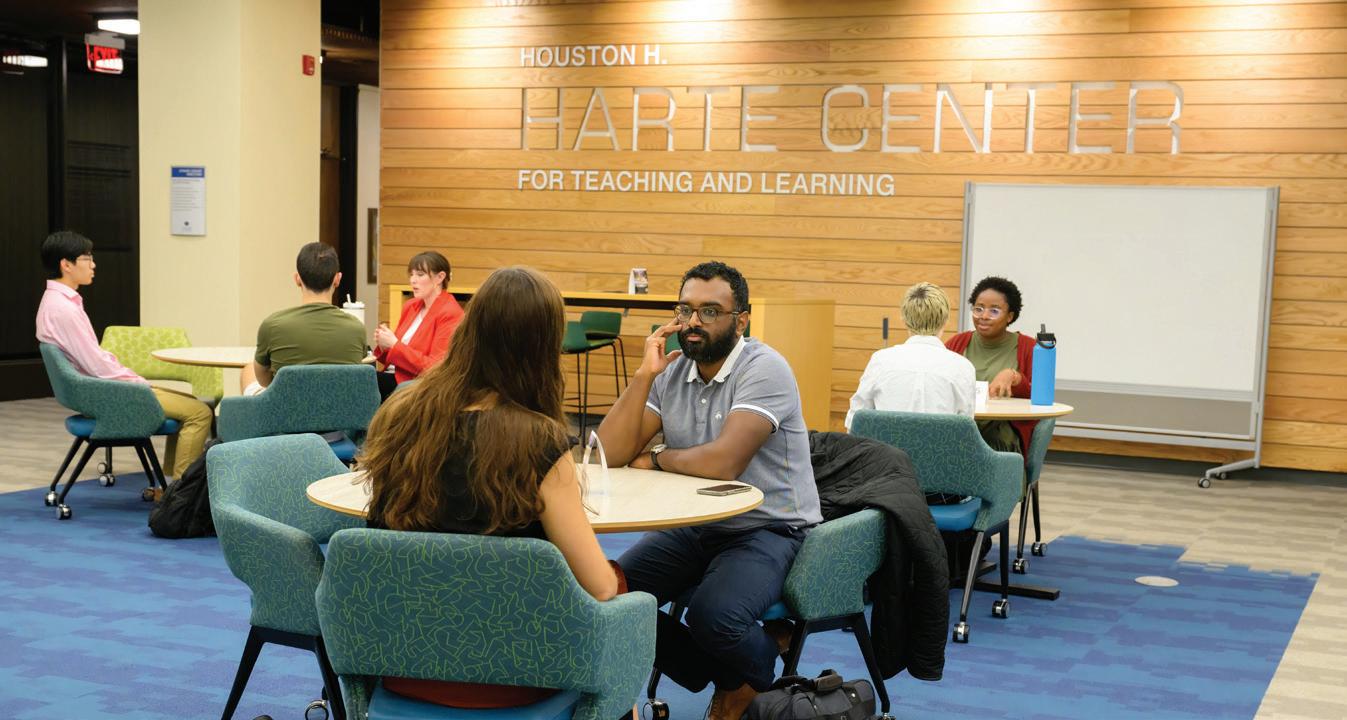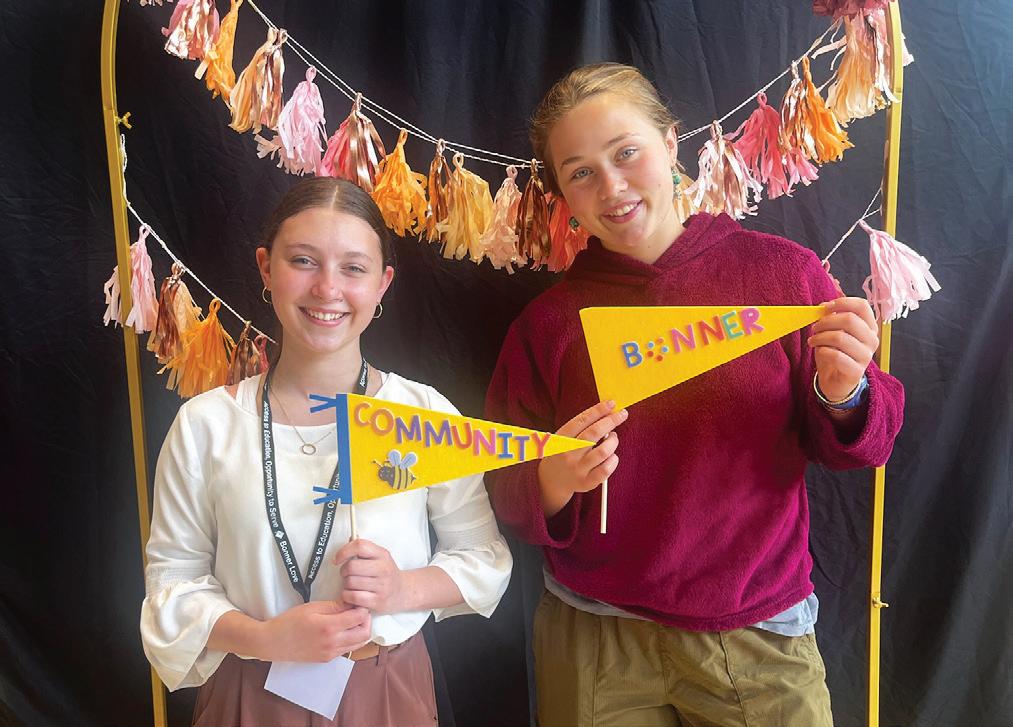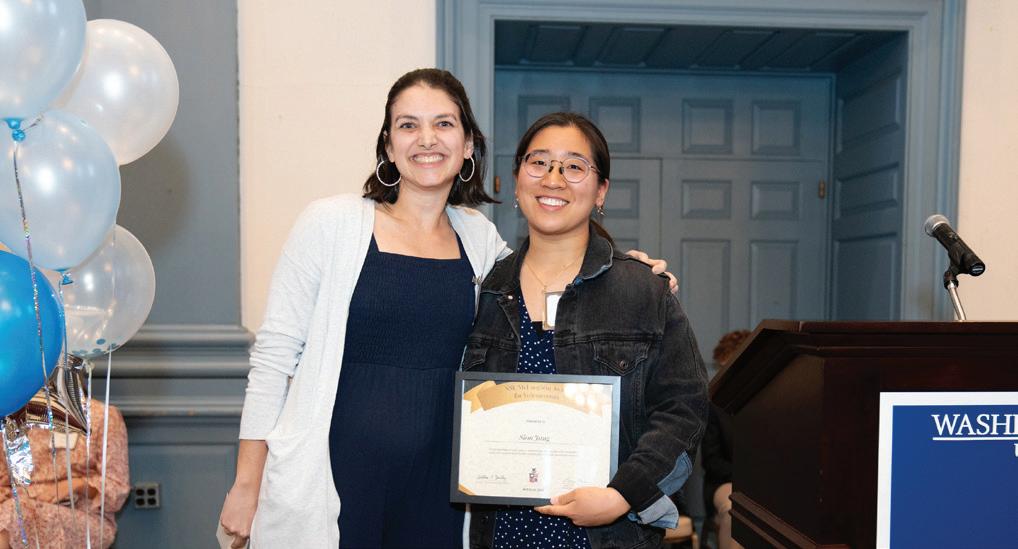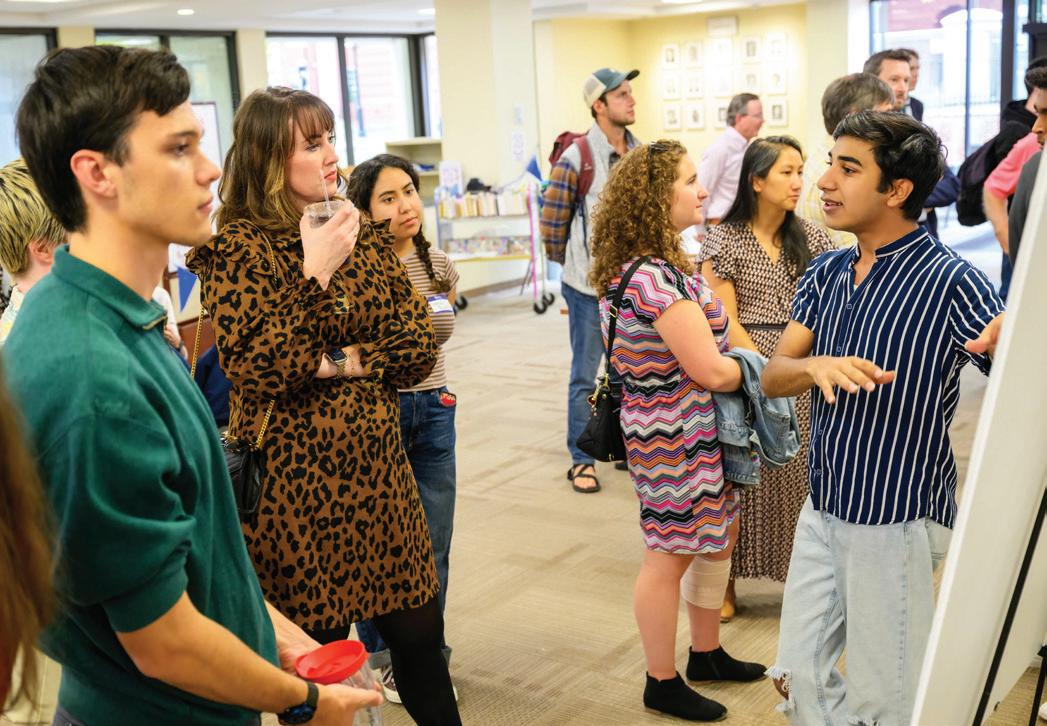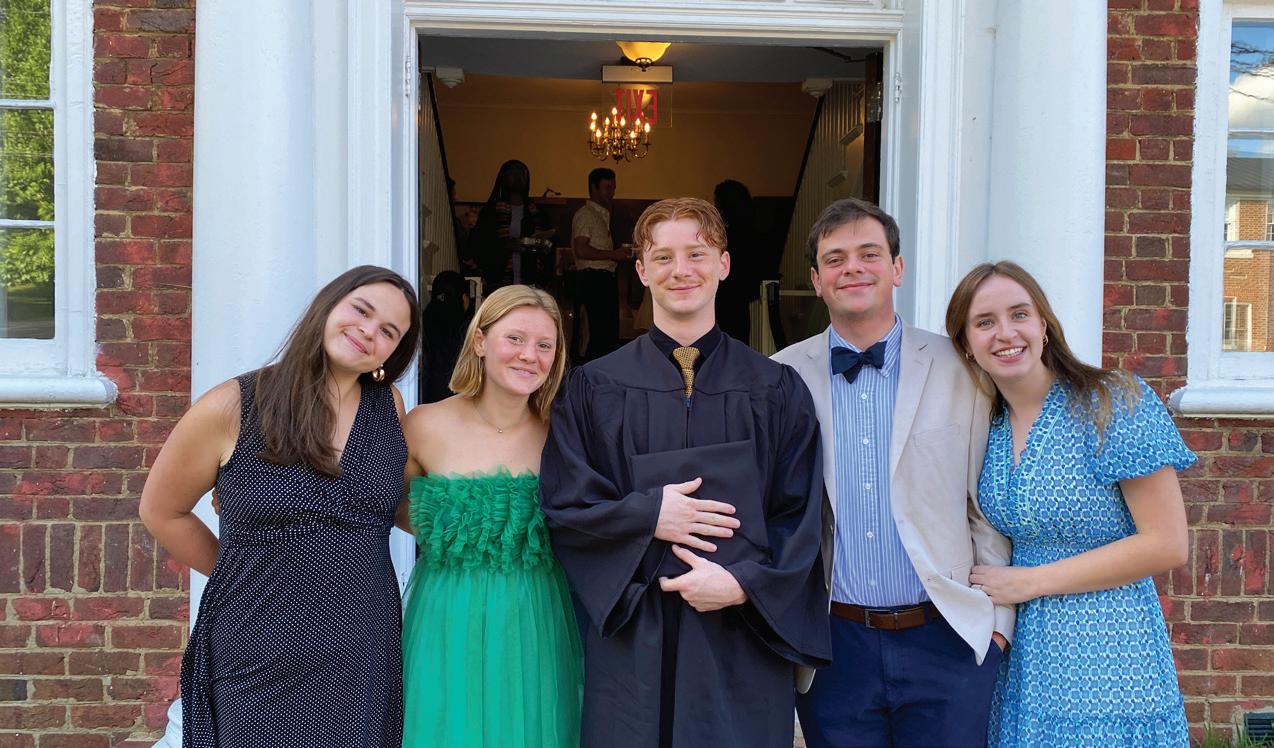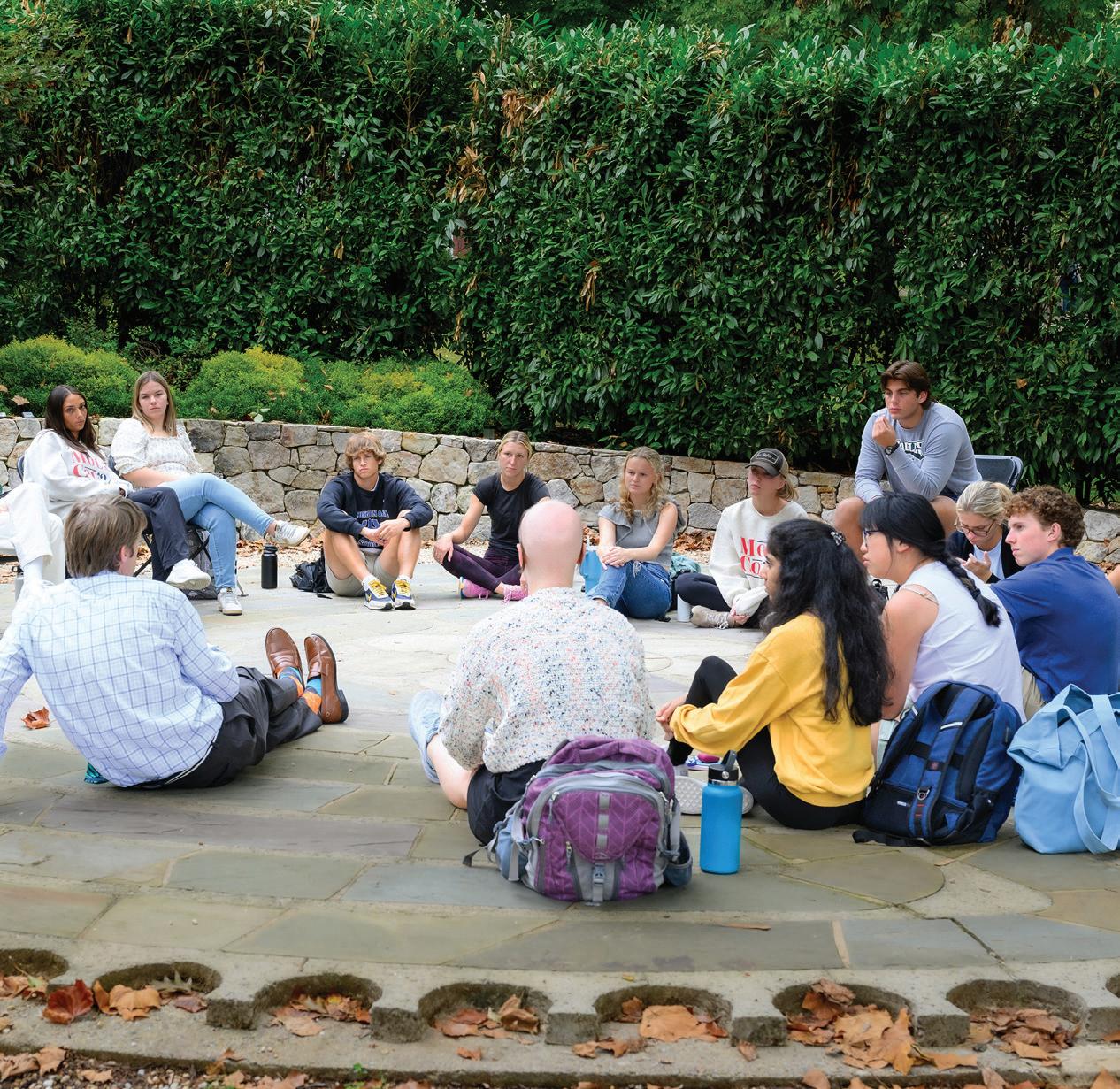
109 Volunteer Venture Participants
12,790 Bonner Service Hours
Students in the Gateway Course


109 Volunteer Venture Participants
12,790 Bonner Service Hours
Students in the Gateway Course
The Shepherd mission: To understand and address the causes and consequences of poverty and inequality in ways that respect the dignity of every person.
Graduated Minors
Summer Interns
Why are we here? More specifcally, what is the point of college?
In particular, what is the point of the Shepherd Program at W&L, especially in an election year?
There are, of course, diferent answers to those questions.
Career Preparation: Some say college is, frst and foremost, preparation for a future career. More accurately, standing on the verge of an unknown world of AI and more, each of us needs the skills, insights, and dispositions not only to get a job, but also to transition to another job a little later on. In fact, each of us needs to be prepared to do work that may not yet even exist.
Consequently, for more than 25 years, Shepherd has offered an innovative interdisciplinary, internship-based curriculum that complements any career path — in health care, law, education, business, and beyond.
Life is, however, about more than a job. And, therefore, so is Shepherd.
Civic Responsibility: Life is also about learning to live well with others. In the hours — not to mention the years — before and after work, we play our parts in our communities. The question is: Do we have the skills, insights, and dispositions to play those parts well?
Consequently, for more than 25 years, the Shepherd Program has ofered courses and community-based learning opportunities that foster the art of respect for the dignity of every person.
Contrary to an increasingly popular opinion, thoughtful people can and often do disagree — including about what respect for others requires of us. Why? Sometimes we disagree over the right policy or practice, because we disagree about what will happen if it is implemented. Call it a Prediction Disagreement
Other times, we disagree over the right policy or practice, because we disagree about what should happen, especially when people’s interests compete for fnite attention and resources. Call it a Prescription Disagreement
Consequently, for more than 25 years, Shepherd has invited people with diferent life paths and perspectives to come together — to research, discuss, and discern how best to respect the dignity of each and every person.
My Main Point: We may disagree about what should be done, but there is a BIG diference between disagreeing about how to respect each person versus whether to do so.
My Invitation to You: Join us in Shepherd as we practice and promote the ART OF RESPECT!

Director
— Howard Pickett
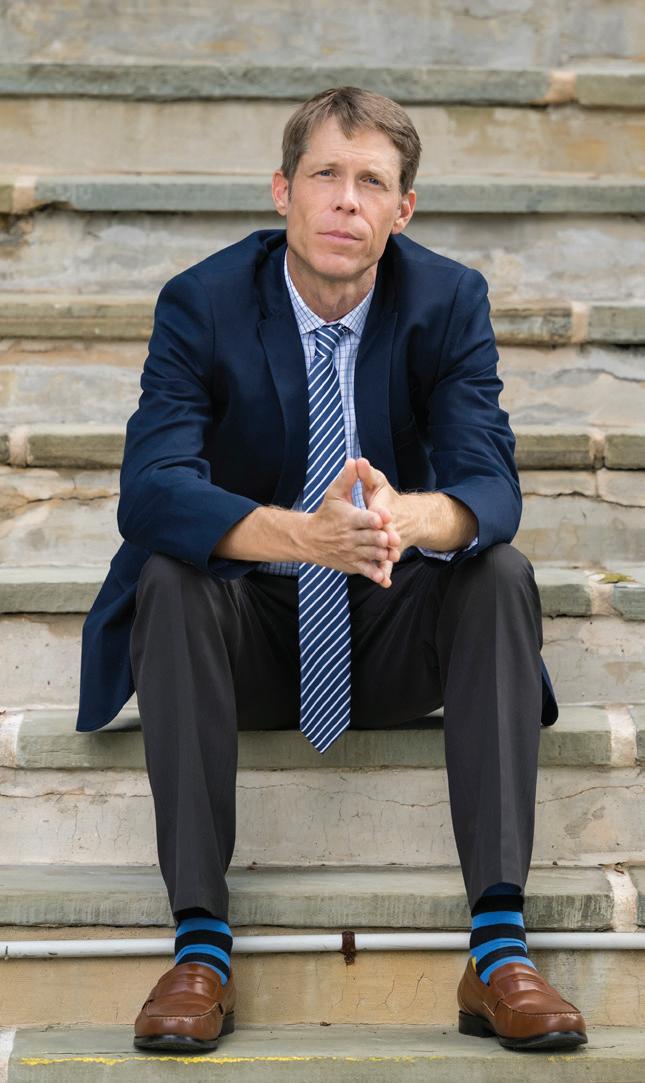
A Shepherd education is rooted in the rich, innovative teaching of Washington and Lee faculty affiliated with the program. Students are encouraged to understand the complex nature of poverty from a host of disciplinary angles. Here, these firsthand accounts provide a window into that learning from the student perspective.

Students in the Shepherd Program are motivated to apply their skills and knowledge to efforts that impact their communities. In a competitive academic environment where students are so often driven by grades and a desire to achieve their individual goals, I have been continuously impressed by Shepherd students who see their involvement in the program as a foundation to effect real positive change in the world. Their enthusiasm inspires me to work harder, to do all that I can to help prepare them for a world they are so eager to improve.
— Professor Alexander C. Sutton, Sociology
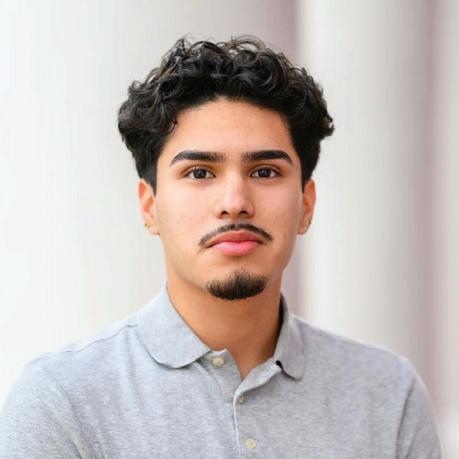
“The
By Joaquin Villagran-Hernandez ’26
I took POL 388, The Architecture of Urban Community, with professor (Robin) LeBlanc because I was interested in examining how the physical development of communities afects the political life of its residents. In this seminar, we examined how urban spaces can promote and hinder inclusion, inequalities, and democracy among citizens. Throughout the semester, we examined the urban spaces of multiple cities from Jane Jacobs’ perspective of American cities in her book, “The Death and Life of Great American Cities;” analyzed Italian cities like Genova, which sufered an economic decline in the 1970s, followed by a new form of urban life renewal; and studied the balance between Tokyo’s bottom-up emergent urbanism and the intimate communal life.
The class was set up in a way that allowed for self exploration of the topic. Class discussions were always flled with conversation about our readings, personal experiences and observations of cities and urban spaces. Throughout the semester, we worked on developing independent research questions on urban spaces and writing a seminar paper. My background and experiences brought me to examine the Tren Maya project, a major infrastructural project in Southern Mexico, and the impact its development would have on Indigenous communities throughout the region.
My curiosity about Indigenous rights and Latin American politics grew after this course and the seminar paper, which I will consider this fall semester when studying abroad in Mexico to research the politics and economics of border policy and migration. That is the beauty of Shepherd courses: They allow students to delve into the topics they are most interested in, take the coursework outside the classroom, and apply it to frst-hand lived experiences. n
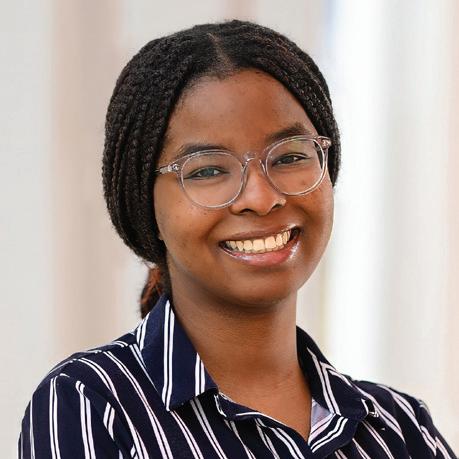
“African
By Posi Oluwakuyide ’24
As an economics major, I felt like I was missing a deeper understanding of social and historical contexts that have shaped economic realities in Africa. Because I took HIST 275 African Women in Comparative Perspective, I was able to gain valuable insights into the ways that colonialism, patriarchy, and economic exploitation have marginalized African women.
One of the most impactful lessons was learning to deconstruct paradigms of race, gender, ethnicity, and religion. The course highlighted how Western research often distorted and inaccurately represented the cultures, social formations, and economies of African kingdoms. We examined how colonial powers systematically devalued and repressed African women’s roles, imposing Western ideals of gender and domesticity that signifcantly altered their social status and economic participation. This historical perspective emphasizes the importance of centering Indigenous lives, perspectives, and research in the discourse, challenging the one-dimensional portrayal of African societies and recognizing the complexities and agency of African women throughout history.
Race has always been the center of my academic and extracurricular explorations. I helped curate an art exhibit that used depictions of Black hair through diferent mediums to tell stories about the interconnectedness of Black history and present-day Black realities, which taught me the ways that lack of cultural awareness creates racialized experiences. I wrote my capstone on racial discrimination in the criminal justice system and interned with USAID to research the importance of diversity, equity, and inclusion initiatives in the responses to humanitarian disasters. This class has added to those experiences by deepening my understanding of the systemic nature of global inequality, which has further impassioned me to pursue a career dedicated to advocating for social justice and equitable economic development on a global scale. n
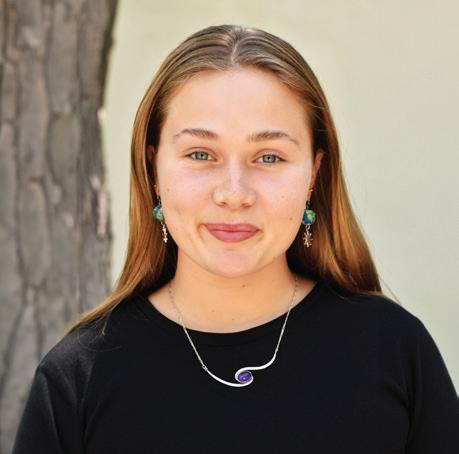
“Social Inequality and Fair Opportunity”
By Stella Ewald ’27
Read that title again.
SOCIAL Inequality and Fair Opportunity. Dr. (Melina) Bell’s course examined multiple facets of inequality, but the most exciting part of the class was that we looked at these issues through a social lens. When working in community service, I sometimes feel that buzzwords hold more space than stakeholders. We spend so much time talking about institutional and structural inequality that these words can lose their value. Theorizing subjects that can be simplified to basic human rights feels stagnant and performative.
Spending a semester looking at the social factors that contribute to inequality felt like a tenable, action-driven approach to community-based social change. We combed over theories of John Rawls, Martha Nussbaum, and Amartya Sen. We read Steinberg’s “The Ethnic Myth” and “The New Jim Crow” by Michelle Alexander and discussed current events as they related to course content. In general, the course provided a space for people of varying political and social viewpoints to discuss the reality of social issues.
PHIL 242 inspired me to focus my work in the Lexington community on relationships. Every day, W&L students create their own perception of the county, and every day, Lexington’s perception of W&L as an institution is open to reshaping. Each small interaction has the potential to build respect and understanding and deepen empathy. n
Course
ECON
ENGL
ENGL
ENGL 393C In the Shadow of the Nineteenth Century Millan
ENGL 395E Topics: Gender in Modern South Asia Chowdhury
HIST 229 History of Poverty in Britain, from the Tudors to the Tories Brock
HIST 259 History of the African-American People to 1877 Dennie
HIST 261 Women and Slavery in the Black Atlantic Dennie
HIST 275 African Women in Comparative Perspective Ballah
HIST 395E Educating Otherness Green
JOUR 268 News Media, Race and Ethnicity Colón
Exploring Social Networks Eastwood
Introduction to Criminology Cataldi
276 Art and Science of Survey Research Jasiewicz
Introduction to Medical Sociology Chin
290C Producing Culture from the Margins Sutton
290E (de)Constructing Disability in the U.S. Sutton
290F Topic: Social Inequality in American Cinema Sutton
291Q Topic: Global Migration Oubou
JOUR 303 Impact of the Press and Public on Justice Locy SOAN/POV 253 Narrating Culture, Society, and Identity Goluboff
PHIL 253 Philosophy of Race Sun
PHIL 260 Political Philosophy: The Social Contract Taylor
PHIL 296E Seminar: Philosophy of Immigration Lamb
Rise Up! Indigenous Poetry and Resistance Michelson
Poetry and Power Michelson
P. Barnes ’25
Why Do We Not Care About Who We Will Be: Ageism, Elderly Poverty, and Healthcare
Christian Basnight ’24
Bridging the Gap: Addressing the Generational Wealth Disparities
Harming African Americans
Eric Bazile ’25
The Poor Tax: Payday Lending in America
Georgia Bernbaum ’25
Welfare At Its Worst: The Ways in Which TANF Disadvantages
Domestic Violence Victims
Anna Bosking ’24
Conditional Cash Transfers and Climate-Induced Migration in Colombia
Alex Bradham ’24
A Public Health Crisis Hidden in Plain Sight: Adverse Childhood Experiences (ACEs) and How We Can Prevent Them
Lawson Brantley ’24
A Polluted Life: Analysis of the Harms in, Social Structures of, and Solutions for Cancer Alley
Mason Davis ’24
Speaking Without Understanding: Populations with Limited English Profciency Facing Barriers in the U.S. Healthcare System
Alina de Zoysa ’25
Sculpting Success: The Impact of Caring Adult Relationships on Student Achievement and Well-Being
Lucy Donahue ’24
Rural Recovery Residences: the Power of Hope, Community, and Gossip
Allie Doyle ’24
Homeless and Pregnant: Consequences and Ways Forward
Cami Fischmann ’24
Trust: a Moderator of Language Barriers and Health Outcomes
*Indicates a
Sarah Footer ’24*
Perspectives on Climate Change in French Polynesia and What They Can Teach Us About Efective and Considerate Mitigation and Adaptation Strategies
Natalie Gresham ’24
The Future of Diabetes Care and Prevention: A Role for Creativity and Hope in Policy Proposals
Andrew Harrell ’24 Public Defense: A System of Inequalities
Leyla Hatfield ’24 From Despair to Dignity: Understanding and Addressing the Substance Use Disorder and Mental Health Crises in America
Kelly Hayes ’24
More Morality: K-12 Moral Education in the Modern United States
Lauren Hollis ’25
Depression as Disability: A Capabilities Approach to Understanding the Depth of Depression’s Impact and its Bidirectional Relationship with Poverty
Jana Hulsey ’25
Permanent Punishment: The Price of Legal Financial Obligations
Brynn Martinson ’24
Expanding Medicaid Coverage and Alleviating Barriers to Medicaid Access to Mitigate Harms Posed on Low-Income Individuals without Healthcare
Elise Molinaro ’24* The Buena Vista Community Garden: A Site for Investment in Community, Education, and a Local Food System
Andrew Morse ’24* How Education Fosters Autonomy for Democratic Participation
Kate Nelson ’24
No One Should Be Given a Price: Forced Prostitution of Women and Girls in the United States
Jessica Pachuca ’25
Break the Barrier: Addressing Language Barriers for English Language Learners in Education
Jordynn Palethorpe ’24* Behind Prison Walls: Exploring Hierarchies, Abuse, and Identity Negotiations in the Carceral System
Christian Pinto ’24* Healthy Relationships: Identifying and Analyzing the Drawbacks of Common Assumptions in Heteronormative Relationships
Derek Qu ’24*
Summer Camp: A Series of Poems
Sydney Smith ’24 New Standards of Care in an Aging Population
Kamron Spivey ’24
The Dignity of Diaspora: How Israeli and Palestinian Dispersal Has Harmed Human Capabilities
Gretta Syrett ’24
A Refection on Maternal and Infant Mortality Rates in the United States
Julia Thomson ’24
Efects of Climate Change and Lack of Electricity on Human Capabilities in East Africa
Allyssa Utecht ’24
Vacant Lots to Thriving Communities: Leveraging Built Environment Interventions to Structurally Address Firearm Violence In Philadelphia
Jeniffer Ventura ’25 Empowering Change: Tenant Association and Undocumented Immigrant Housing Rights
Berkeley Wall ’24* Against the Grain:
A Global Agricultural Commodity Trade Network Analysis During the COVID-19 Pandemic
Trip Wright ’25*
Unveiling Racial Disparities in Public Transportation Connectivity:
An Analysis of Neighborhoods in Washington D.C.
W&L President William Dudley, Stacy McLoughlin Taylor ’02, Claiborne Taylor ’02, Eddie Nabors, Doris Nabors, Katie Yurechko ’24, Jenny Sproul Davidson ’08 and Lee Lester ’02 celebrated Jonathan Nabors ’02 with the rededication of his plaque on March 8 outside of Mattingly House.
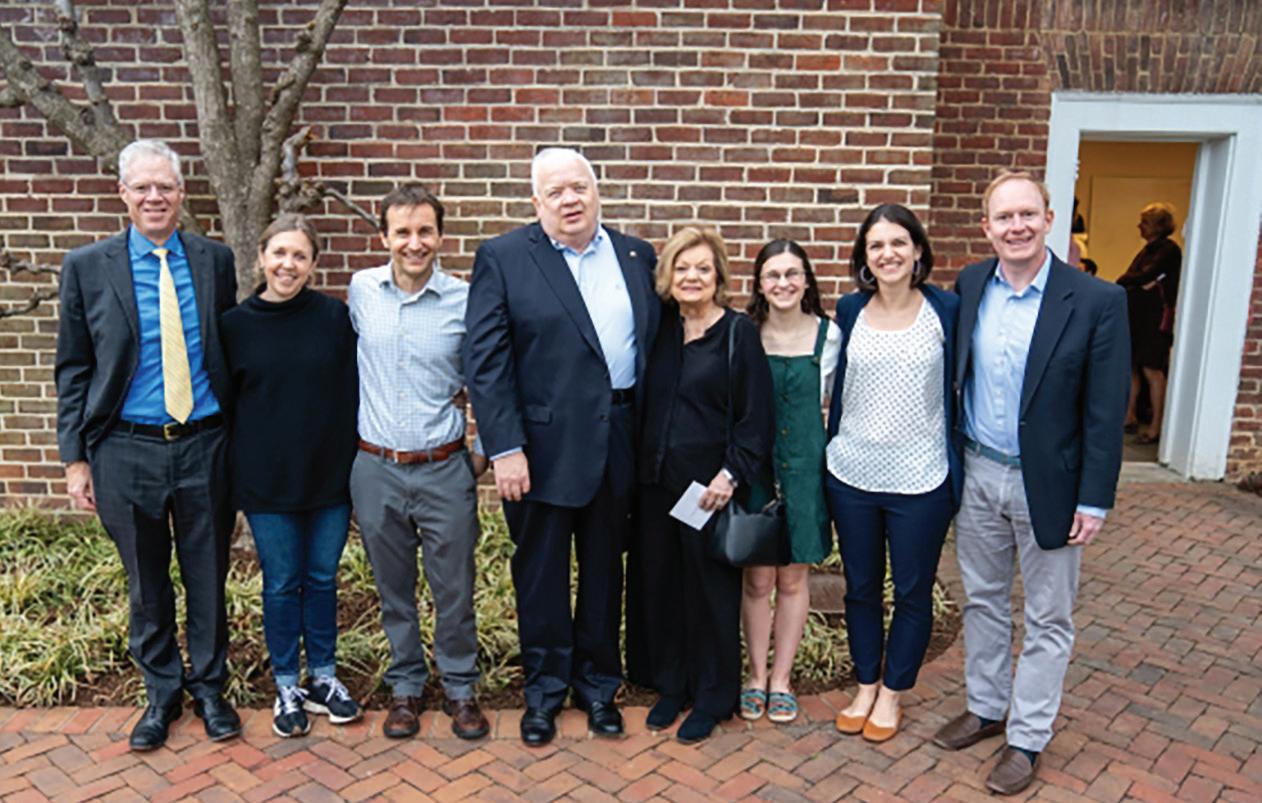
By Laura Lemon
For 25 years, Eddie Nabors and his wife, Doris, have traveled to Washington and Lee from Birmingham, Alabama, to honor their late son, Jonathan Nabors ’02, on Nabors Service Day. On March 8, the day before its 25th anniversary, Jonathan’s memorial plaque was rededicated next to Mattingly House, and Eddie knew exactly what he wanted to share with the crowd.
“W&L is exactly the right place to memorialize him,” Eddie said. “He loved this place more than I can explain to you. After a college visit tour during his junior year of high school, he knew this was where he belonged; this was it.”
Jonathan and his sister, Leah, died on Jan. 3, 1999, in a car accident on their way to campus following winter break.
The class of 2002 organized the frst Nabors Service Day in 1999 to honor Jonathan’s memory and continue his legacy of building community.
“He was just such a bright light, so community-oriented and would draw people in,” said Stacy McLoughlin Taylor ’02. “That spirit of wanting to be with others, looking out for others and making sure that everyone around him just felt good — I think [creating a service day] just spoke to his character.”
Over 170 frst-year students participated on that inaugural day, helping at Rockbridge Area Relief Association (RARA), Yellow Brick Road Early Learning Center, Boxerwood Gardens and a Big Buddy/Little Buddy field day.
“It was a hard, long winter,” Claiborne Taylor ’02 said.
“And it just felt to me like spring personifed — like turning a corner, being together and doing something meaningful.”
The student body decided to put forth a continual effort of service that extended beyond one day, and the following fall, the Nabors Service Day transformed into the Nabors Service League (NSL).
In the 25 years since, NSL has joined together thousands of students in their passion for community engagement. NSL is now organized into four committees: Good Nabors, educational programming, alternative breaks, and local service.
Good Nabors, a first-year cohort, was established in 2019 under NSL to offer a more defined pathway to service for incoming first-years. The program also helps new students connect to like-minded individuals before they even attend their first class.
The Educational Programming Committee plans events and panels where alumni speak on their engagement with service. The Alternative Breaks Committee organizes trips beyond Rockbridge County where students can assist local agencies in other communities. NSL’s Local Service Committee conducts outreach to area organizations to determine their volunteer needs and connect students to local volunteer opportunities. NSL President Katie Yurechko ’24 was thankful to be able to utilize her computer science major and explore her passion for technology and addressing social injustice, culminating in a tech equity series.
“Nabors Service League has really allowed me to take that passion and turn it into something that’s not just a little thing that I worked through in my mind, but it’s something that’s really impactful for the community,” Yurechko said.
In the decades that have followed their graduation, Jonathan’s classmates continue to be amazed by the powerful ways their friend still brings people together and the ways his character, embodied in NSL, impacts students who never even met him. n
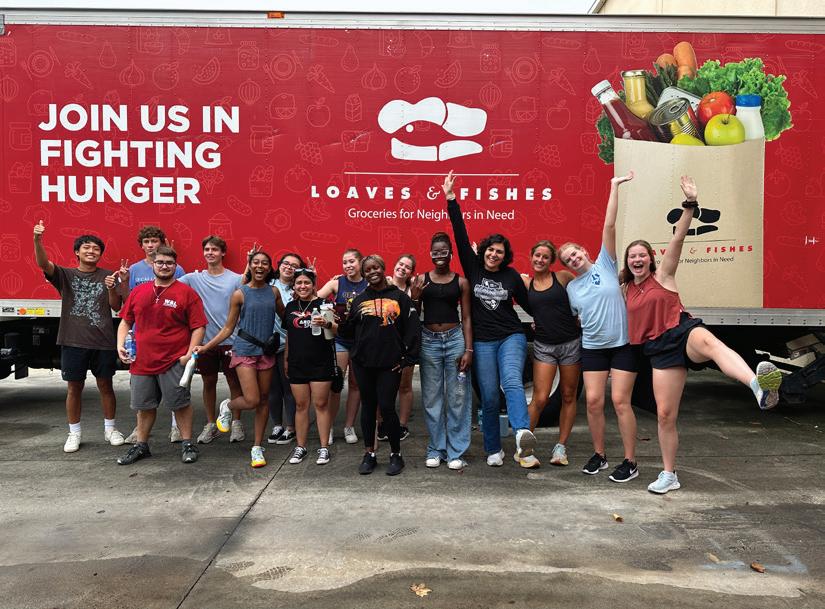
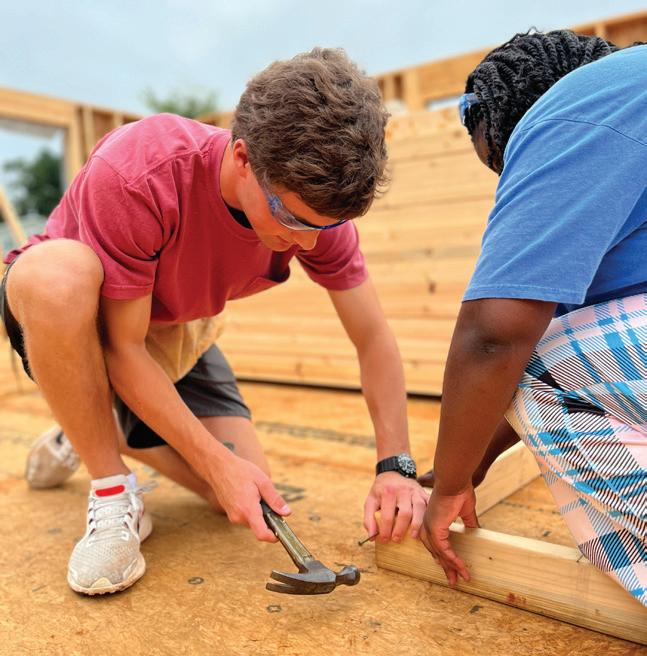
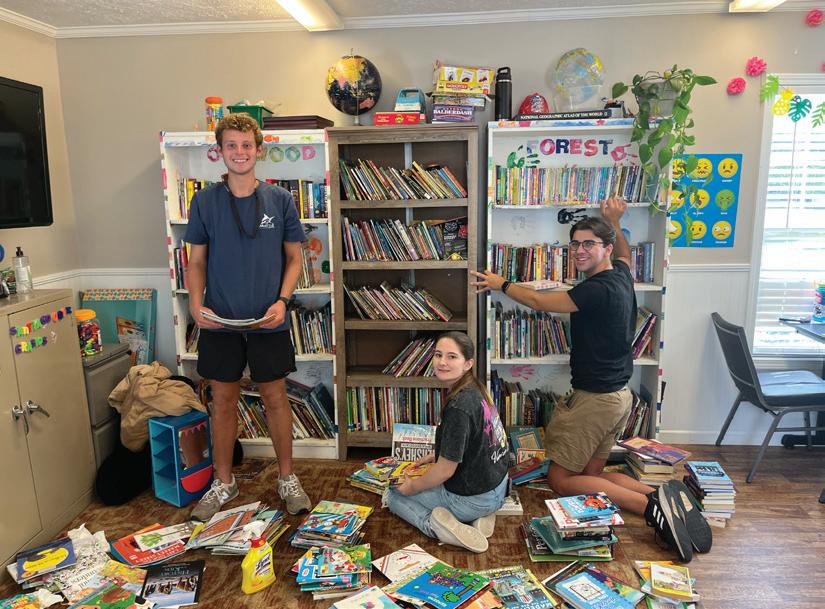
Volunteer Venture (VV) is a service-learning Leading Edge program for incoming students. Sponsored by the Shepherd Program, VV allows participants to build meaningful relationships and explore issues related to poverty, injustice, and opportunity through service with community-based agencies, guest speakers, and group discussions related to a thematic issue. Topics for the 2023 experience included food and housing insecurity, law and justice, and the social determinants of health. n
7 Trips | 7 Cities | 35 Peer Leaders | 109 First-Year Participants
I really enjoyed seeing how many of the organizations worked together to form a community that directly assisted those at a disadvantage. I had never realized that these organizations worked together so closely. I had always thought that these organizations were completely separate, but it showed me that it takes a well-run machine to help so many people in the community.
— VV 2023 Trip Participant
On my VV trip I learned how dignity matters in every aspect of one’s life. I also learned not to judge people based on the background or environment because we don’t know what the person has gone through.
— VV 2023 Trip Participant
The most valuable aspect of my VV experience was defnitely the group refections at the end of the day. These debriefs not only helped my group become closer but also allowed us to meld together our ideas, thoughts, and lived experiences into one.
— VV 2023 Trip Participant
W&L’s Bonner Program is an initiative of the Corella and Bertram F. Bonner Foundation and the Shepherd Program. Bonner Scholars are committed to working alongside communities to develop as professional and civic leaders, foster relationships, cultivate community, and work to create increasingly compassionate systems.
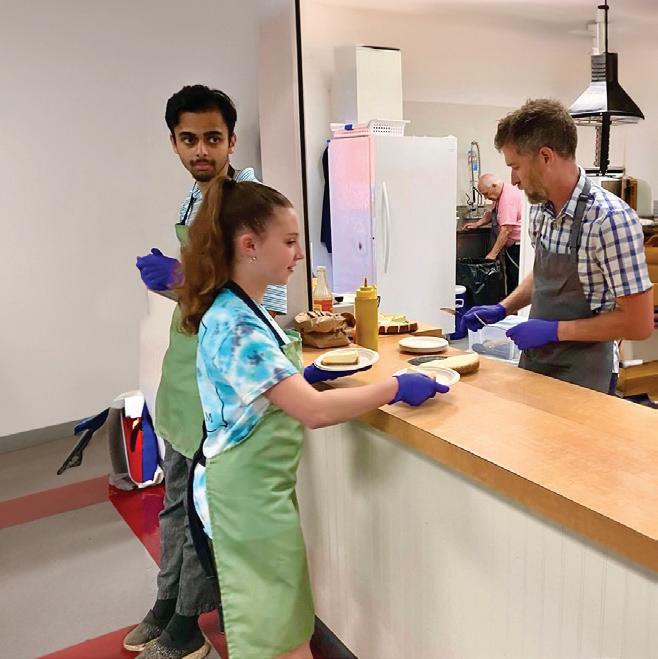
Bonners serve in internship-style community partnerships for 8-10 hours per week throughout their time as a student and complete at least one summer of service. In addition to the professional development ofered by these opportunities, students
participate in a credit-bearing academic developmental model that is rooted in the poverty and inequality studies curriculum of The Shepherd Program. Critical and creative refection, paired with trans-disciplinary approaches to complex social issues, creates a rich landscape for exploring the problems associated with poverty and inequality and for developing a purposeful civic life. n
Serving with the Connect and Nourish (CAN) program has given me the unique opportunity to work with members of the community who are passionate about service and provide guests with W&L hospitality. CAN is a community-building experience that involves meeting people where they are across Rockbridge County and connecting people over fresh, free, catered meals. There is nothing I look forward to more on Wednesday evenings than traveling of campus with fellow W&L volunteers to serve and unify communities, while connecting people to services and resources.
— Morgan Schuckman ’27
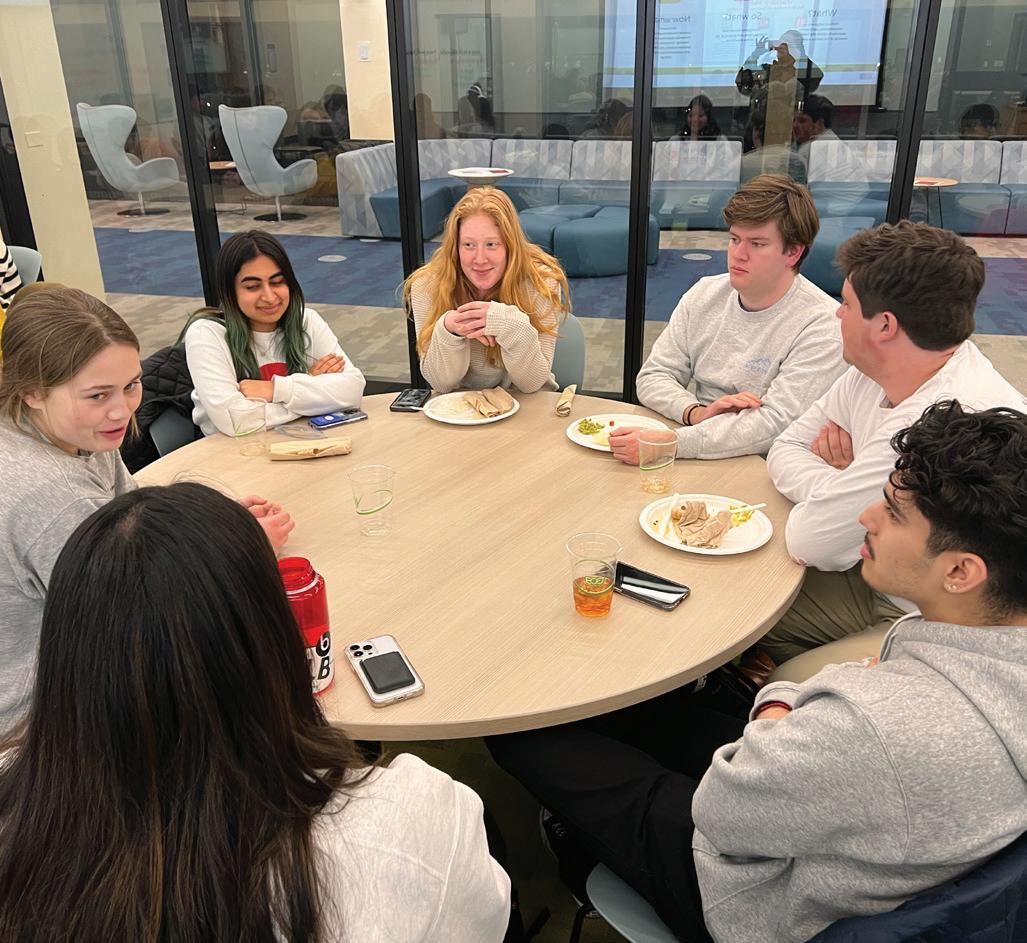
My involvement with the Bonner Program has had such a profound impact on me over the past four years. This past year, I have been interning at the Community Foundation for Rockbridge, Bath and Allegheny through Bonner. In this role, I have had the opportunity to write the resident and staf policy booklets for Rockbridge Recovery’s HOPE House, the region’s frst transitional sober living home. This experience has taught me the importance of radical respect, dignity, and empathy as well as provided me with a new skill set through the policy creation process. Through this role, I have been exposed to new career opportunities in the nonproft space. This has been a full-circle experience for me being able to combine my interest in community engagement and nonproft work, fostered by the Shepherd Program, with my coursework and professional interest in accounting and fnance. I am extremely grateful to have had this experience and immerse myself in the Rockbridge community.
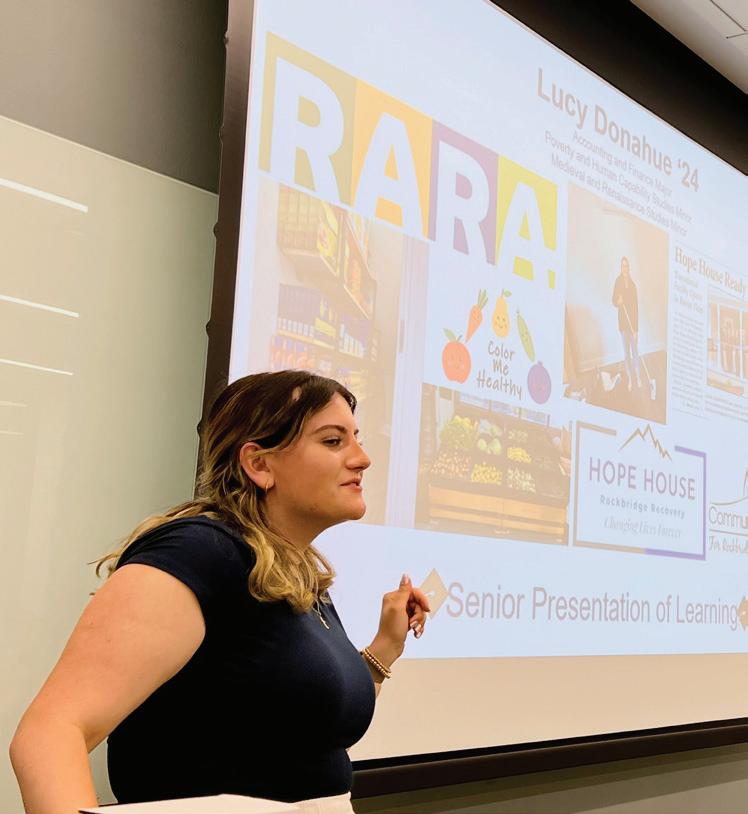
— Lucy Donahue ’24
This Winter Term, students in the Bonner Program met for a fve-session series focusing on refection in community-based learning. The series examined strategies for respectful observation, metacognitive approaches to responsible storytelling, and efective facilitation strategies. In each session, students experienced a combination of theory-based lectures and group discussions based on the issue area around which they serve.
Students engage in group discussion at Bonner reflection series meeting.

The mission of the Campus Kitchen at Washington and Lee (CKWL) is to strengthen bodies, empower minds, and
build communities through food. Student leaders coordinate food preparation and delivery logistics, attend events and discussions, and work with staf to facilitate fnancial
stewardship and development for the organization. n
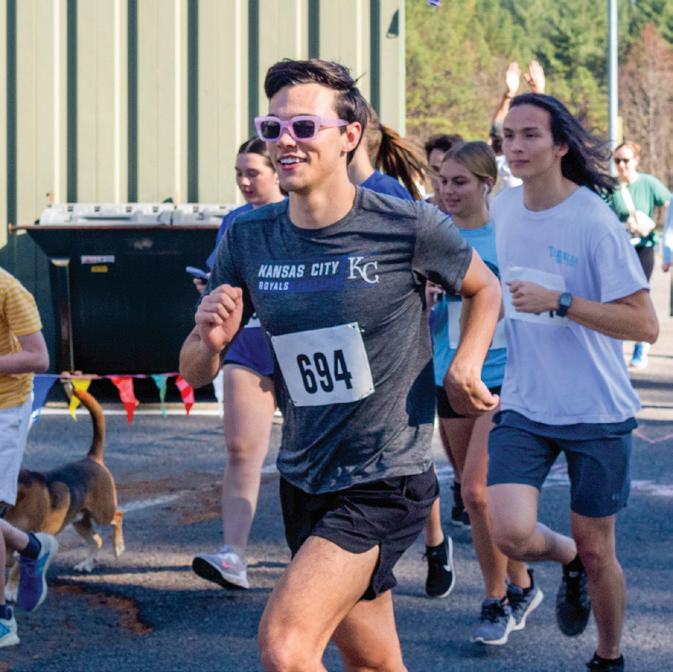
At CKWL, we promote nutrition and address the issues We collaborate with other student organizations at W&L and of food waste and food insecurity in Lexington and the wider Rockbridge County in joint events around relevant Rockbridge County. We work toward this by transforming topics to the food system. During students’ time with CKWL, food that would otherwise go to waste into balanced meals they develop meaningful relationships with clients that go for low-income members of the community as well as beyond service. Our students learn to think critically about collaborating with community organizations to provide the variety of ways that they can have a lasting impact within groceries through our Mobile Food Pantry, Backpack and our community by supporting existing organizations Produce Delivery Programs. and projects.
Meals Delivered: 11,646
Nutrition Education Instructional Hours: 3,903 hours
Pounds of Groceries Distributed: 34,568
Volunteer Hours: 3,434
#HungerFighters Cohort Members: 20
Campus Kitchen Leadership Team Members: 35 Backpacks: 20,609
This year, the Campus Kitchen developed student understanding of the context in which food insecurity and food waste developed, and this public event series engaged participants beyond the Campus Kitchen Leadership Team. By cultivating an understanding of the broader system in which food insecurity persists, the Campus Kitchen fosters students’ abilities to identify the root of the issues they are passionate about addressing and encourages them to think beyond the meals they provide to the ways in which we can all work to ensure equitable access to food in the future.
Total Unique Event Attendees: 213
Average Event Attendance: 50 people
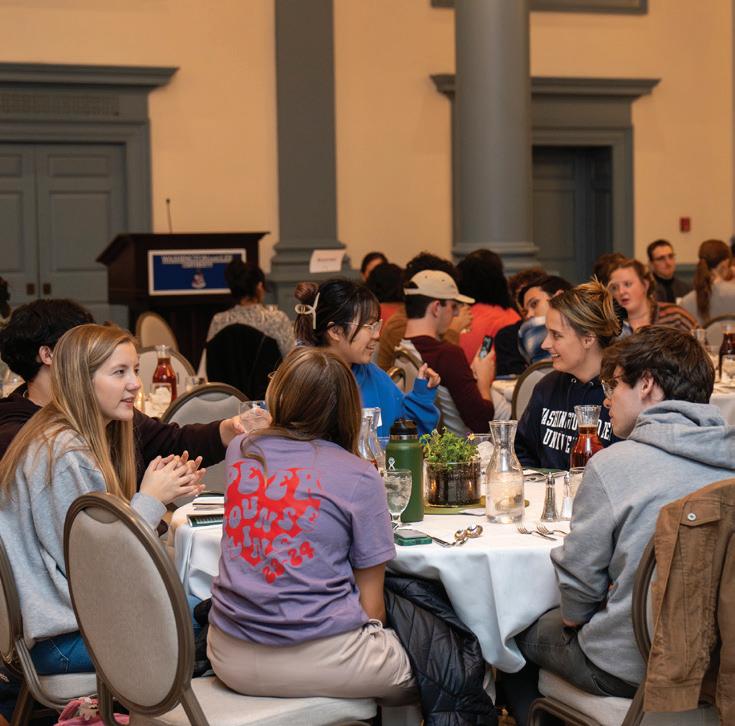
The Blue Ridge Mile at Washington and Lee University, established in 2020, assists clients in acquiring or maintaining a driver’s license, which is often complicated due
to confusing rules, challenges with obtaining the required legal documents, or lack of sufcient guidance. BRM is operated by students and strives to aid clients throughout the year. Since last year, the Blue Ridge Mile Clinic has grown from 12 to 16 advocates.
We will begin recruiting and onboarding additional advocates at the beginning of 2025. n
Blue Ridge Mile served 39 clients this year. Client referral reasons include: driving on a revoked/suspended license, having no license at all, unpaid child support, DUI 1 and 2, no insurance, no money for reinstatement, and no transportation to or from work. The most common reasons for referral were having no license or driving on a revoked/ suspended license, as displayed by the graph below. Most Blue Ridge Mile clients request services afer being stopped for having a suspended license.

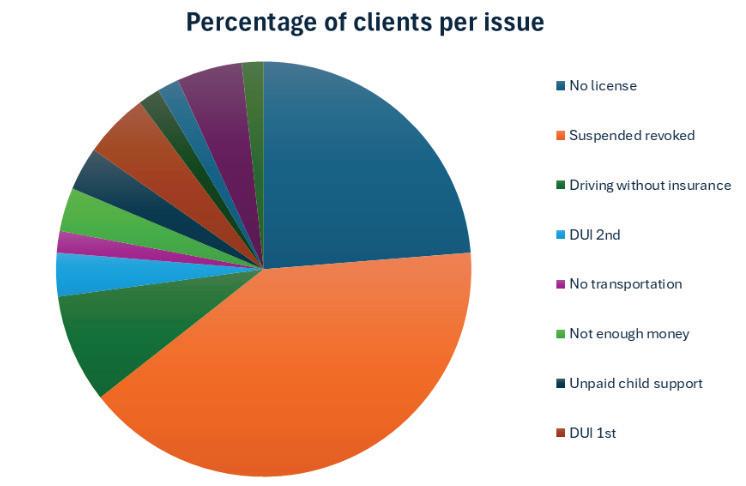
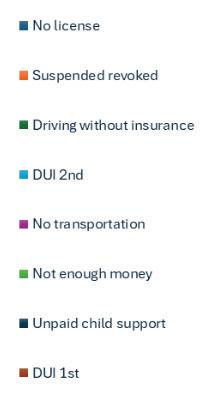
The Blue Ridge Mile hosted a trip to Richmond, Virginia, which was attended by several advocates after the end of the General Assembly’s legislative session to tour the Capitol and the General Assembly Building. The trip was organized and supported by Drive-to-Work CEO Sarah Wilson.
Campus activities included speaker David Pina from Chainless Change, who is dedicated to ending mass incarceration by ofering reentry support to individuals and communities negatively impacted by the carceral system; a virtual talk hosted by author of "Not a Crime to be Poor" and Georgetown Law professor Peter Edelman, Students visited the General Assembly in Richmond, Virginia. who has practiced law and conducted research at the intersection of poverty and the American criminal legal system; and a screening of "Being Michelle," a powerful flm documenting the story of a deaf woman with autism who survived incarceration and abuse and now uses her art to cope with her trauma and recover from her past.
Research & Policy.
With the support of faculty and community partners, Blue Ridge Mile developed a survey to assess defendant beliefs and barriers related to their driving privileges. This survey aims to inform judges, Drive-To-Work, the DMV, and the Virginia General Assembly about ways to improve the relicensing process.

NSL’s educational series focused on policy in action, featuring Avani Kashyap ’25 at the kickof. Alumni speakers on campus included Charles Allen ’99, Elizabeth Mugo ’19, Madison Sanders ’16, and Shiri Yadlin ’12. Students also zoomed with Liz Cresswell ’09 and Henri Hammond-Paul ’12 about climate policy and discussed education policy with Rebecca Etzel ’10, Samara Gibbs ’10, and Melissa Poorman ’08.
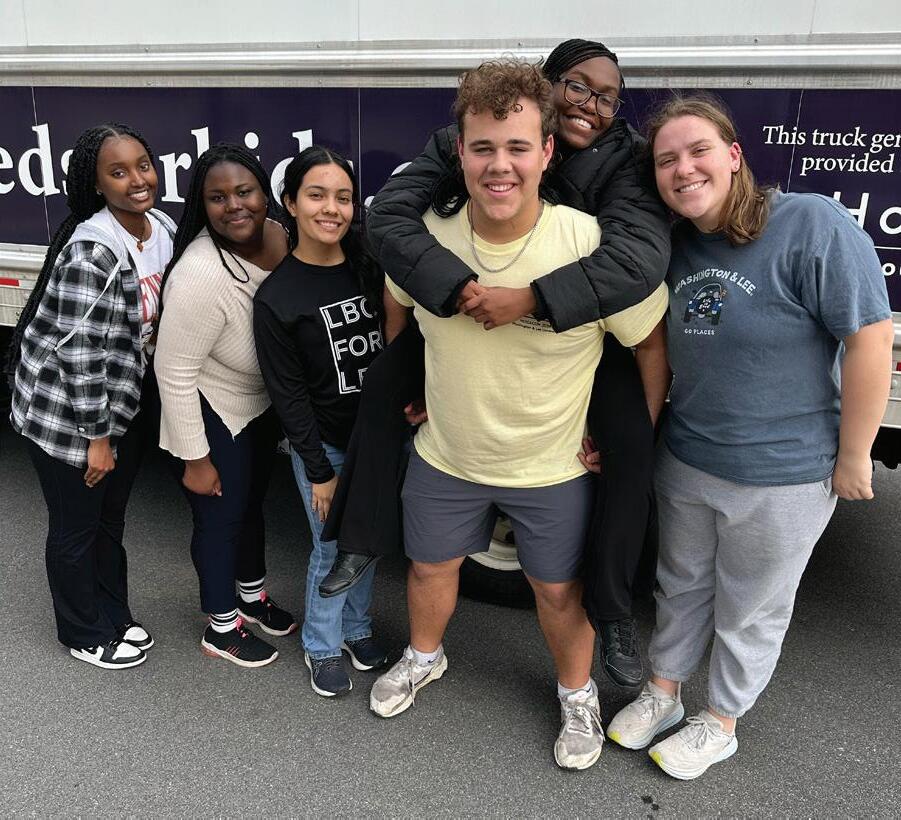
Through the Good Nabors program, NSL ofers the opportunity for frst-year students to intentionally commit to service in the Rockbridge community and learn and refect on critical issues related to poverty and inequality with peers and peer mentors.
The Nabors Service League, in collaboration with community-based agencies, connects students with opportunities to learn, serve, and refect on issues of poverty and justice. The student leadership team is comprised of four committees: Local Service, Educational
Programming, Alternative Breaks, and Good Nabors Mentorship. The Good Nabors program provides a frst-year cohort of students a structure for community
engagement, refection, and learning. n
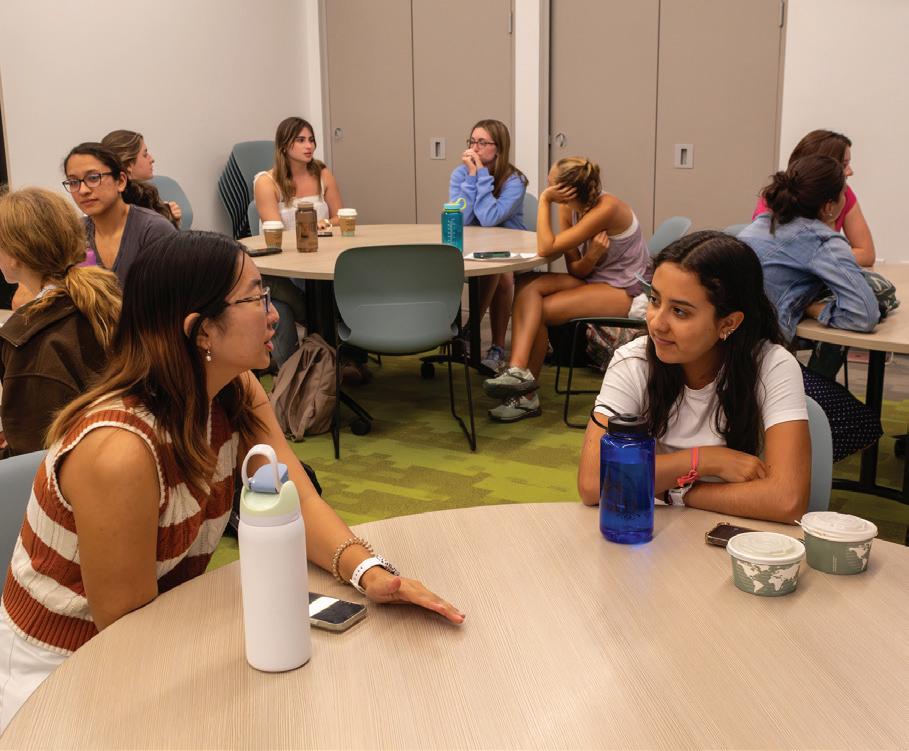
This year, NSL sponsored volunteerism throughout the year. A new opportunity of particular interest to students was working alongside the Friends of the Greenwood Cemetery. Nabors Service Day was held in March alongside an event commemorating 25 years of the Nabors Service League. Students also participated in alternative break trips to Richmond, Va., over Reading Days and to Charlotte, N.C., over Washington Break.
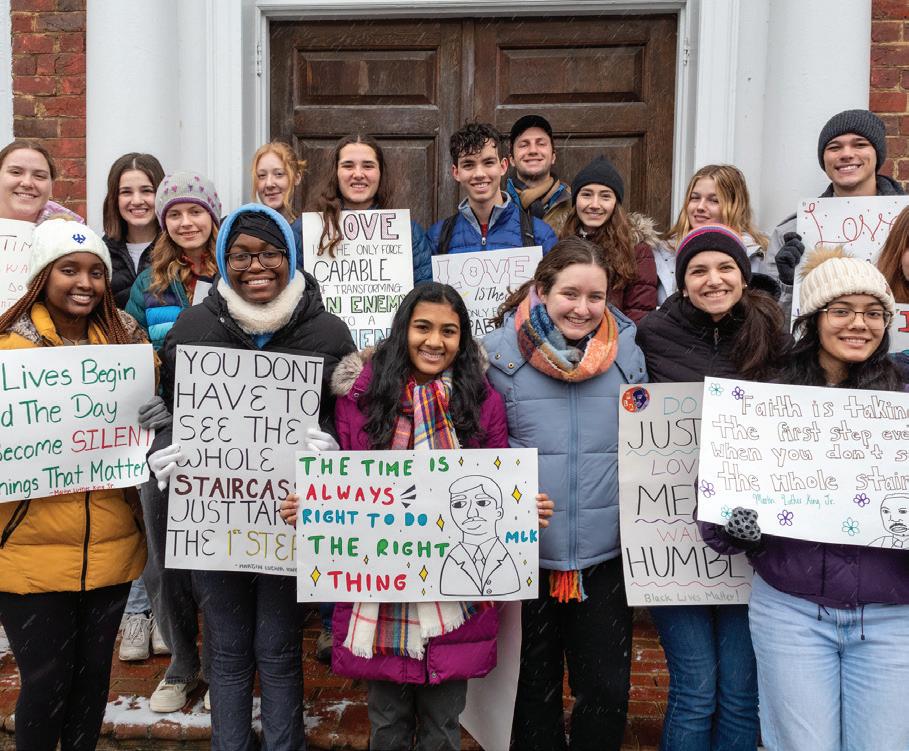
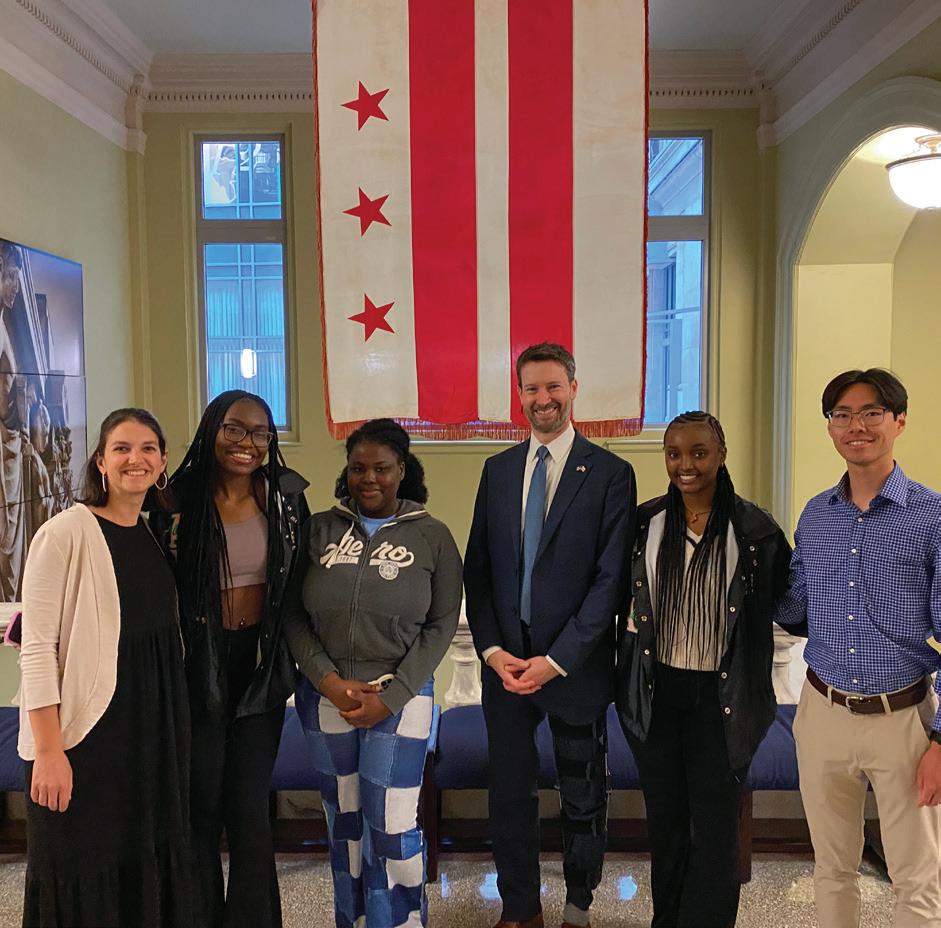
The Shepherd Program hosts an annual trip to Washington, D.C., for students to meet Shepherd alumni and learn from their career experience. The 2024 trip featured visits with Charles Allen ’99, George Foote ’70, Elizabeth Mugo ’19, Jake Struebing ’14, and Shiri Yadlin ’12, followed by an alumni dinner. n
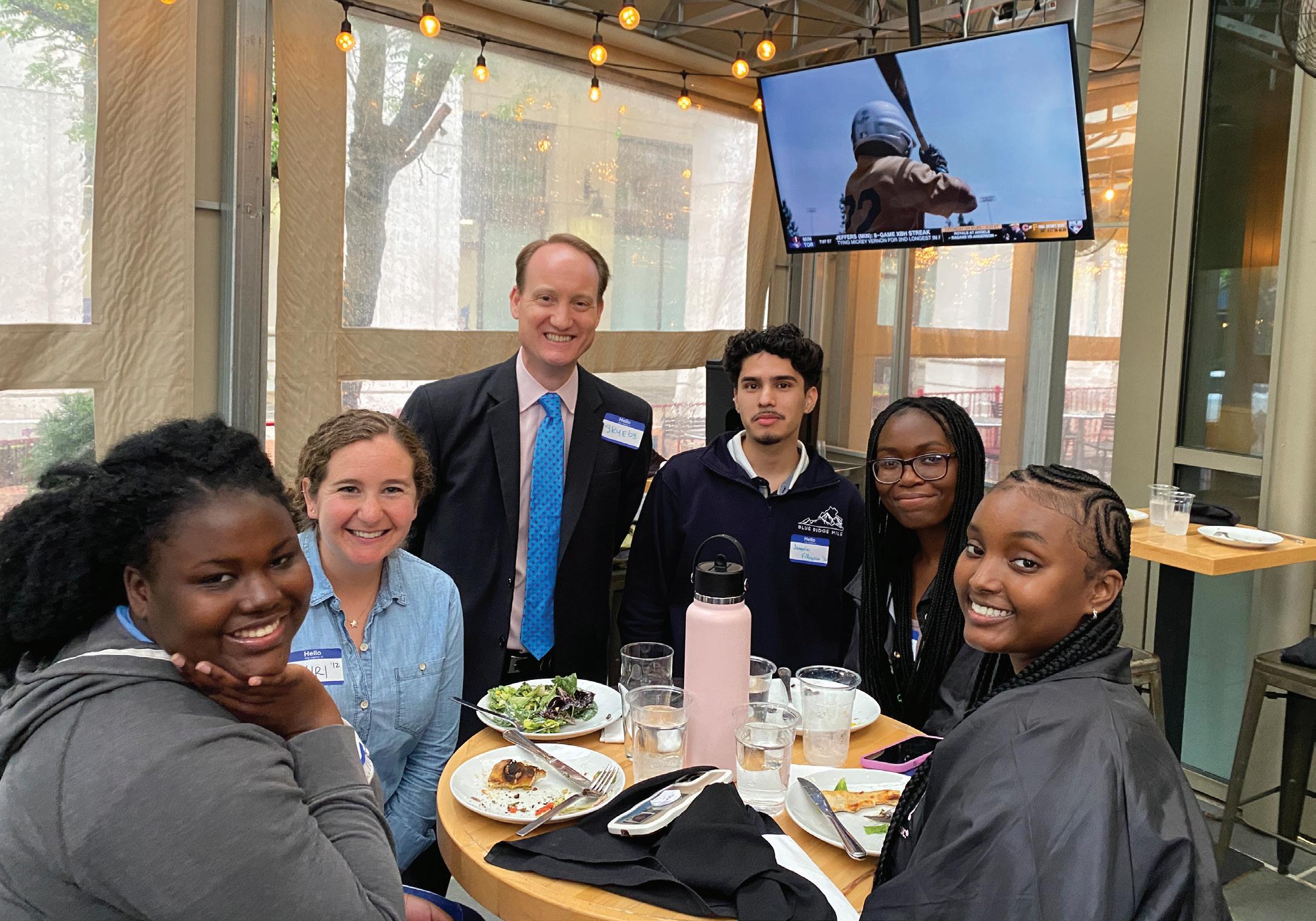
Number of participants: 46
We provide opportunities for students to understand the causes and consequences of poverty and inequality in ways that respect the humanity of all people through eightweek summer internships. While students approach the experience with an eye toward professional development, it is equally important for them to understand that important lessons are learned outside the internship experience and will come in ways they least expect.
Shepherd internships are located in various urban and rural sites in the United States and globally, with a focus on education, health care, legal services, housing, hunger, social and economic needs, and communitybuilding eforts.
Many W&L students intern through the Shepherd Higher Education Consortium on Poverty (SHECP). Additionally, students support organizations in the Lexington area, participate in international internship programs, and propose their own internships in communities all over the United States. n
Throughout the summer, I had the opportunity to intern with Judge Eannace and Judge Caldwell in the Utica City Court and the Oneida County Court in Central New York. From this experience, I observed the different problem-solving courts, including the Mental Health Court, Family Treatment Court, Empowerment Court, and Drug Court. At the end of my summer in Utica, I presented a paper to Judge Ralph J. Eannace, Jr. about what I learned from observing and working alongside him that could be implemented to make the court program more effective.
My internship in the two different courts allowed me to look into what working in the court system entails. I spoke with other judges and attorneys who gave me a perspective on law school and suggested what I could do to prepare myself. This internship was crucial for me to make those connections and better understand what I want to accomplish after graduating from Washington and Lee. Returning to campus, I hope to bring the different perspectives and ideas I gained from the courts in Oneida County into my work in the Rockbridge area with the Blue Ridge Mile Clinic. n
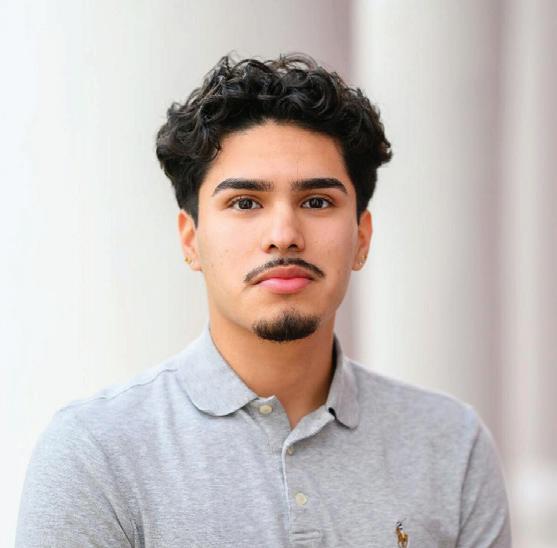
Brave to Rebuild, the organization where I interned, focuses on helping families in Ukraine whose houses were destroyed due to the Russian invasion in 2022.
The various experiences and workplace exposure I have taken part in throughout the course of this summer has been beneficial in helping me discern potential career paths, expand my understanding of the causes and consequences of poverty and inequality, and increase my social communication skills. My time taking part in a SHECP internship has equipped me with skills and strategies I will utilize throughout the rest of my professional career and personal life. The emotionally demanding work has prompted me to develop various self-care techniques and reflection strategies that have allowed me to understand myself better and flourish as an entire person. In addition, my interactions have prompted increased questions about the intersection of religious identity and social impact work. n
Susquehanna Legal Aid for Adults and Youth (SLAAY) is a legal aid organization and low-income tax clinic seeking to provide legal services and education to residents of North Central Pennsylvania. As a case worker and intern this summer, I was engaged with various tasks and projects for both SLAAY and the community revitalization initiatives in Shamokin. I had the opportunity to take part in one-on-one client interactions, develop legal and life skills lessons, work on developing SLAAY’s brand as a nonprofit, create marketing materials, redesign the organization’s website, conduct a community needs assessment, and partner with the Shamokin Area Housing Authority to supply muchneeded resources to the residents. I have also had the opportunity to meet with various passionate Shamokin community members involved in the city’s economic and social development. This internship has granted me multiple experiences likely not offered at a larger, for-profit law firm, such as meeting the district bankruptcy judge in Harrisburg or helping clients complete legal documents one-on-one.

I coordinate the project called “Brave Bikes.” We transfer used bicycles from Europe to Kyiv, repair them, and send them to the communities in recently deoccupied territories. Additionally, I help organize events for the Brave to Rebuild community and foreigners who volunteer with us. Each weekend, I join the efforts of dismantling rubble in the Kyiv region. This internship is of special significance to me because feel responsible for
acting and providing relief to those affected by unjust violence in my native Ukraine. Being able to intern at Brave to Rebuild brings me closer to achieving my dream of starting my own NGO. I have become much more aware of the current Ukrainian environment and how to navigate work during the full-scale war. I am sure this will help me apply the knowledge gained from the Poverty and Human Capabilities Studies program. I am sincerely grateful for the unwavering support of the faculty and donors, whose belief in me and this cause made my internship possible this summer! n
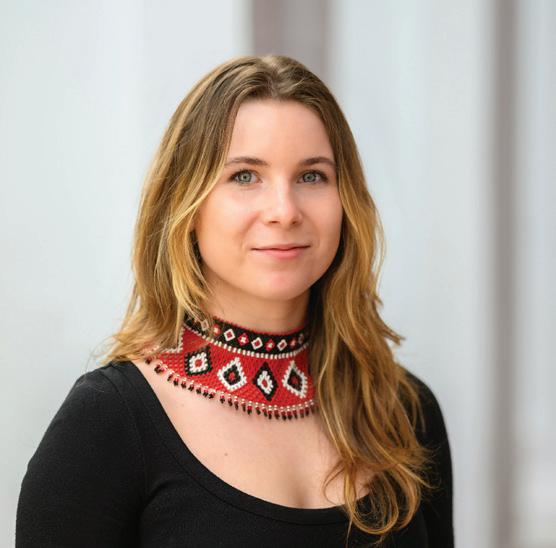
Location
Sylvia Agatako Habitat for Humanity Lexington, VA
LeAnna Baker Susquehanna Legal Aid for Adults and Youth (SLAAY)* Susquehanna, PA
Daisy Barron CKWL Lexington, VA
Stephanie Boktor Good Samaritan Health Center* Atlanta, GA
Alex Bradham Project Horizon Lexington, VA
Sai Chebrolu Brunswick Public Defender* Brunswick, GA
Adam Cline Harvard Legal Aid Bureau Cambridge, MA
Autumn Crawford Asylee Women Enterprise* Baltimore, MD
Cassandra Dalton Legal Aid of West VA* Charleston, WV
Janae Darby Virginia Incubator Association Buena Vista, VA
Alina de Zoysa Times Square Alliance New York, NY
Dev Maniar ConnectionsPlus Healthcare + Hospice Lexington, VA
Eleni Filley Central Virginia Legal Aid Farmworkers Program Richmond, VA
Cami Fischmann Health Brigade* Richmond, VA
Nina Gagnon Staunton Public Defenders Office Staunton, VA
Joanna Guevara-Hernandez CRIT, Fundación Teletón Merida, Mexico
Dani Hackman YMCA Lexington, VA
Maddy Hayes Americana World Community Center* Louisville, KY
Riho Iijima Rockbridge Area Relief Association Lexington, VA
Tim Johns Habitat for Humanity Lexington, VA
Tetiana Kozachanska Brave to Rebuild Kyiv, Ukraine
Isabel Lourie CKWL Lexington, VA
Amelia Macholz Feeding Chittenden* Burlington, VT
Zainab Madan Good Hope Support Organization Moshi, Tanzania
Gabe Miller National Alliance to End Homelessness Washington, D.C.
Ana Montano Martinez Rockbridge Area Relief Association Lexington, VA
Linda Margaret Morse City of Lexington Office on Youth Lexington, VA
Lizzy Nguyen Integrated Community Alternatives Network (ICAN)* Utica, NY
Vishal Pal YMCA* Charleston, WV
Charlotte Peete CKWL Lexington, VA
Molly Pennisi CKWL Lexington, VA
Daniel Reiter STAR Program Lexington, VA
Kat Repka STAR Program Lexington, VA
Rachel Romano CASA of Cape May and Atlantic Counties Somors Point, NJ
Kendall Schlueter HRAE (Hospital) Merida, Mexico
Emma Scott Guilford County Office of PD* Greensboro, NC
Rachel Silver Legal Services of Alabama and Atlanta Legal Aid
Alec Sirois YMCA STEM Program Denver, CO
Sydney Smith REAL LIFE* Richmond, VA
Patrick Solcher United Way of the Coastal Empire* Savannah, GA
Parker Sparks STAR Program Lexington, VA
Jaeya Taxali Pueblos of Santo Domingo and Cochiti Sante Fe, NM
Aishwarya Vemagiri ConnectionsPlus Healthcare + Hospice Lexington, VA
Joaquin Villagran-Hernandez Utica Court System* Utica, NY
Trip Wright D.C. City Council Washington, D.C.
Hamza Zia Project For Peace: Khwaja Siras Pakistan
*Indicates SHECP Internship
The Shepherd Alumni in Action event, held in October, featured a Q&A with Washington, D.C. Ward 6 Councilmember Charles Allen ’99 and three alumni panels: Grad School & Gap Years; Medicine & Public Health; and Research & Policy. The summit also featured opportunities for personal connection between students and alumni. n
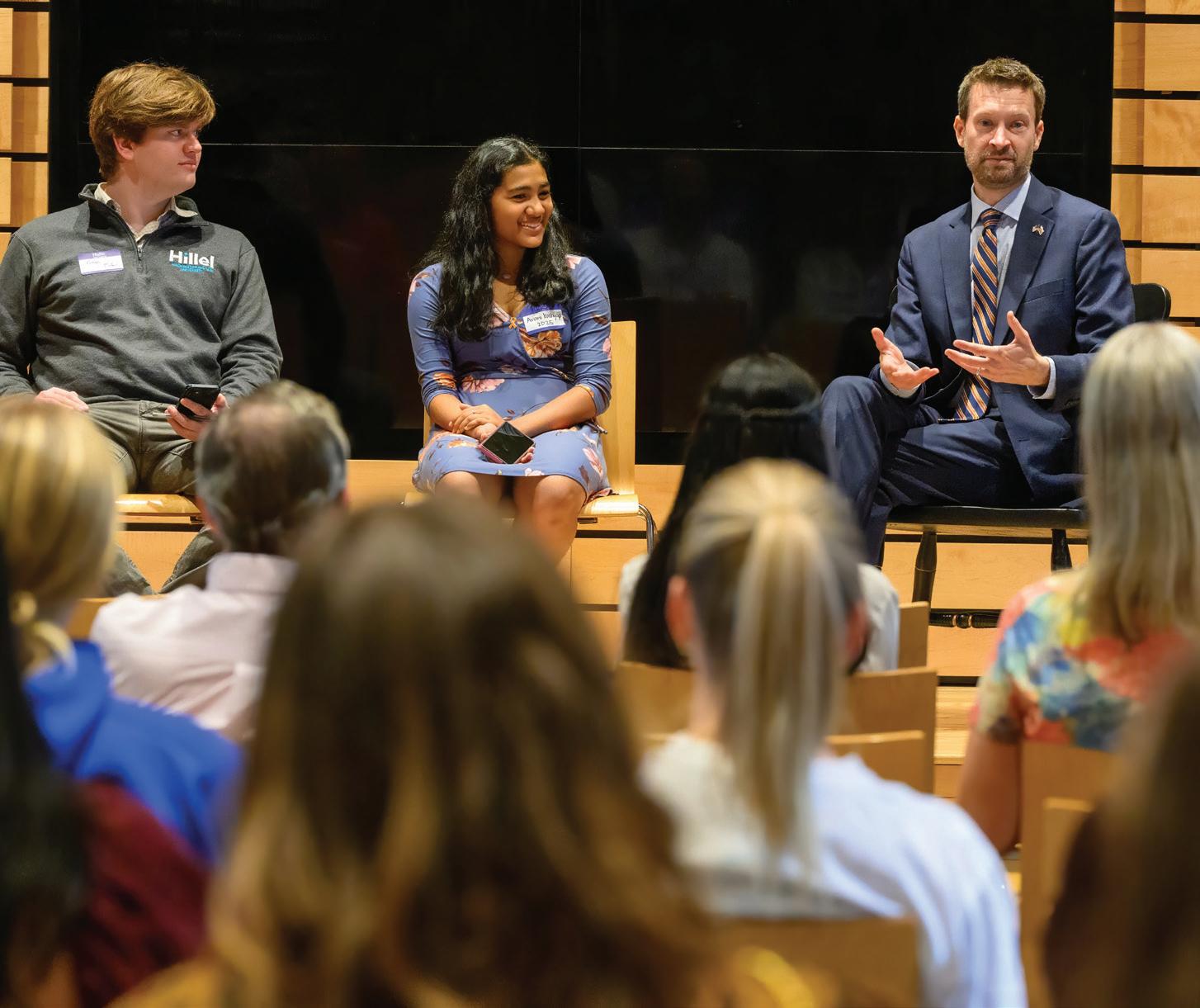
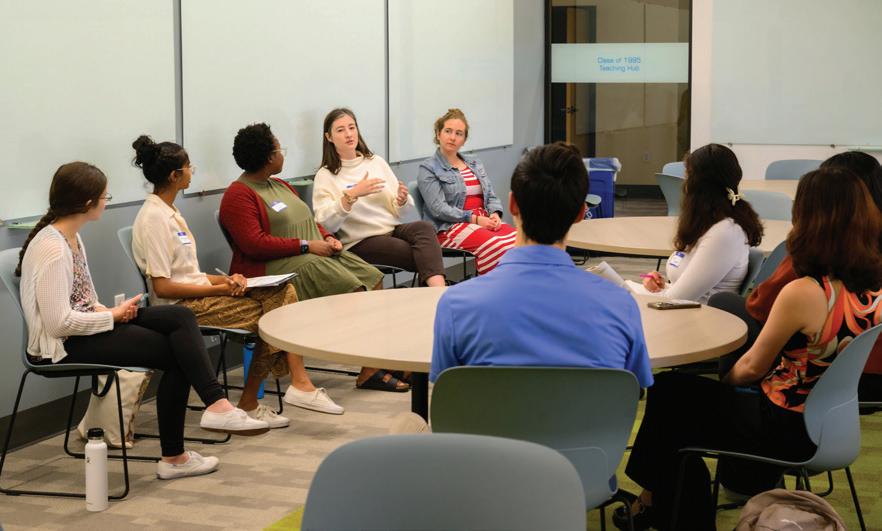
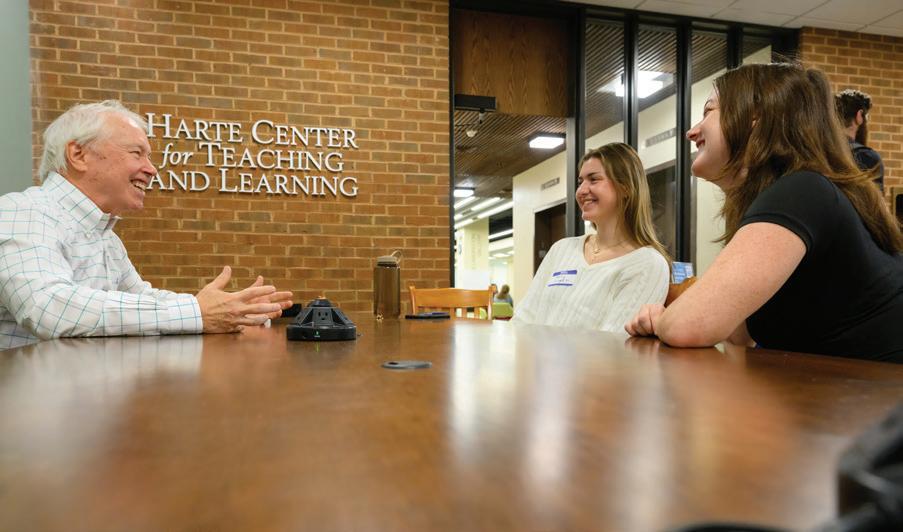
Tuscaloosa, AL & Lawrenceville, GA
Chris Washnock ’12
Maisie Osteen ’14L
Elspeth Suber ’21
James Ricks ’21
Kelli Jarrell ’12
Melissa Medeiros ’09
Samara Gibbs ’10
Tyra Barrett ’18
Kerriann Shabanowitz ’13, ’16L
Elizabeth Mugo ’19
Madison Sanders ’16
Morten Wendelbo ’12
Kathryn Marsh-Soloway ’13
Nicole Gunaswansa ’14
Alvin Thomas ’14
David Thomas ’15
Hannah Witherell ’20
Shepherd is—and always has been— special because of the people involved! The connections and community here are invaluable to what we do and why we do it. In the Shepherd Alumni Mentor Program, our goal is to make and maintain meaningful connections that provide encouragement, advice, opportunities, and enjoyment, especially during life’s transitions from college to career, from one career to another, and beyond. The program creates a supportive community of alumni and community partners with a shared interest in living out the Shepherd mission through their professional and civic lives. n
Anna Bosking
Lawson Brantley
Emma Conover
Mason Davis
Anna Cami Fischmann
Sarah Footer
Kelly Hayes
Jordan Jontz
Shanna Kim
Isabel Lourie
Elise Molinaro
Ayomiposi Oluwakuyide
Jordynn Palethorpe
Elizabeth Sjovold
Sydney Smith
Kamron Spivey
Gretta Syrett
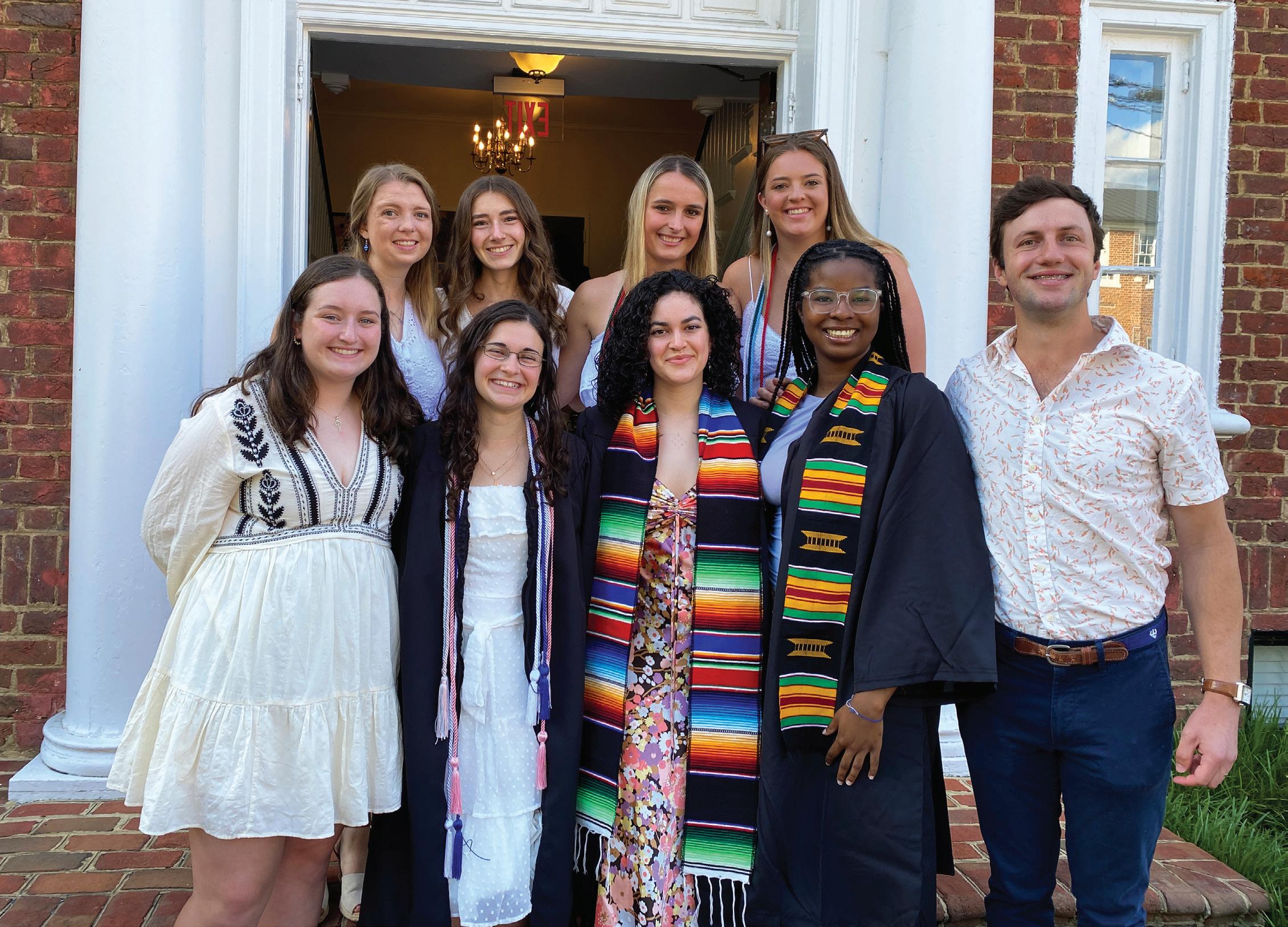
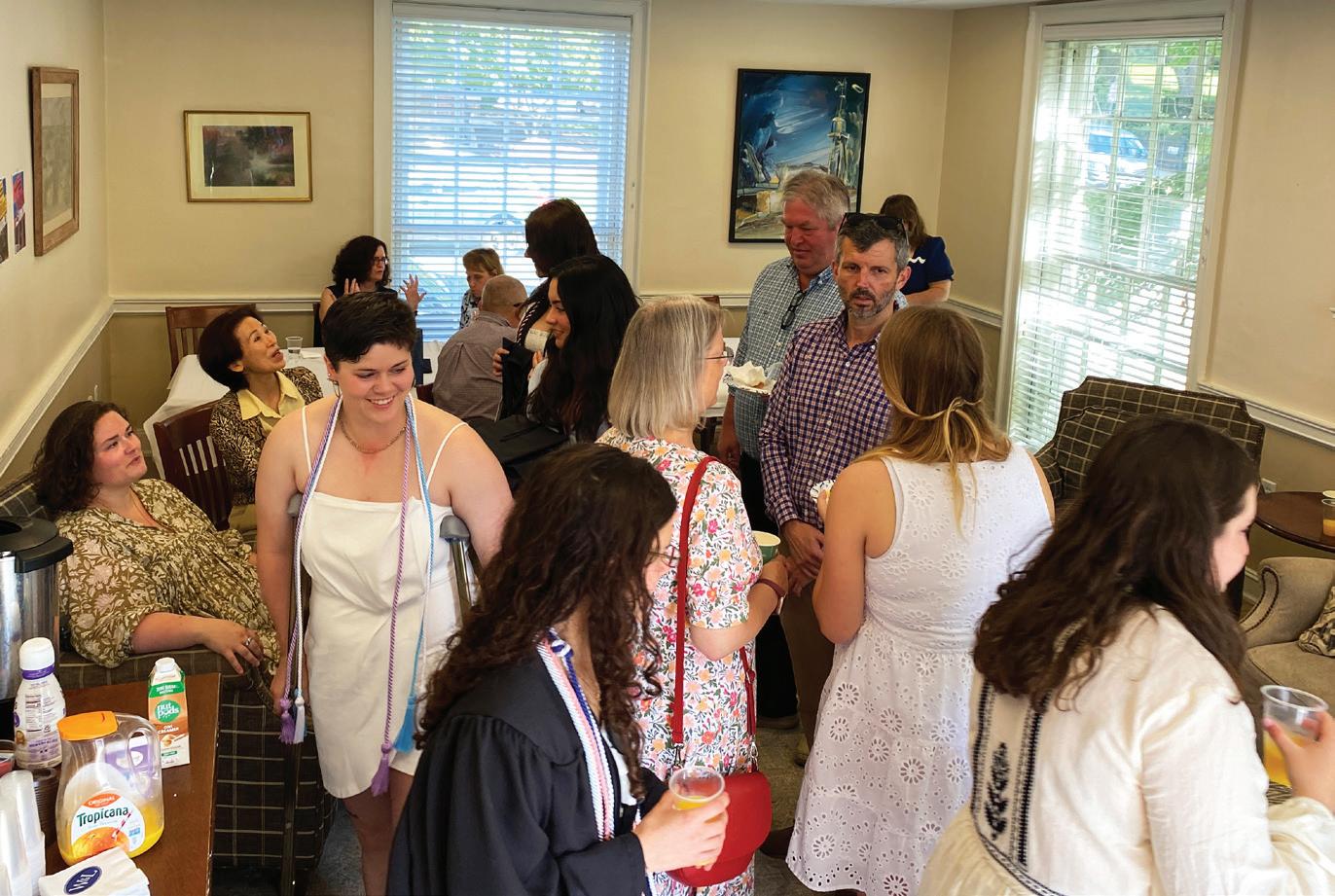
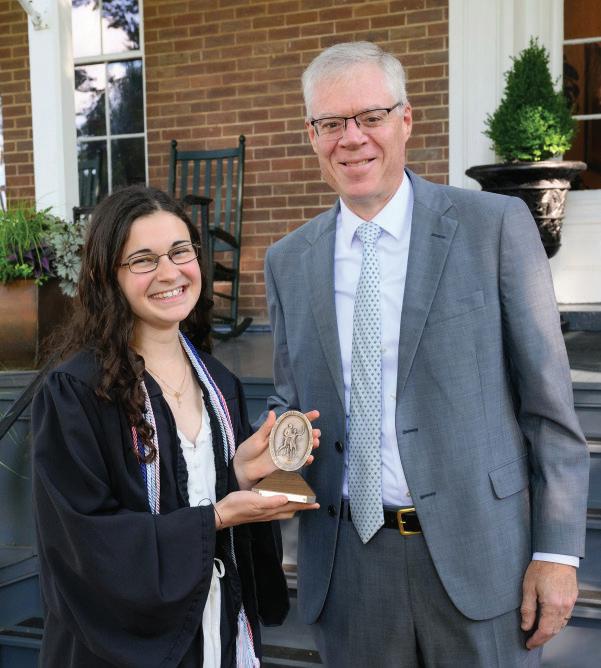
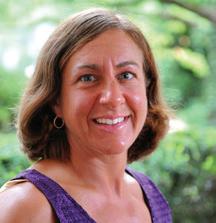
Melina Bell Professor of Philosophy and Law
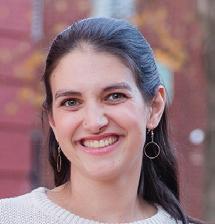
Jenny Davidson Associate Director Instructor of Poverty Studies

Art Goldsmith
Jackson T. Stephens Professor of Economics
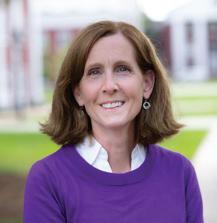
Karla Murdock
Jo M. and James M. Ballengee Professor of Cognitive and Behavioral Science
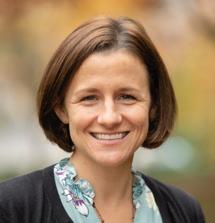
Katie Shester Professor of Economics
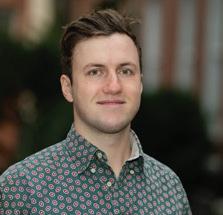
Ryan Brink Assistant Director Campus Kitchen Coordinator

Jon Eastwood Professor of Sociology
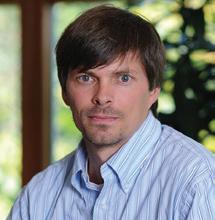
Joseph Guse Professor of Economics
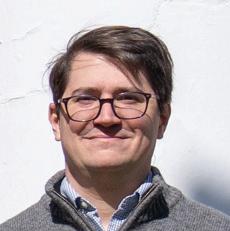
Marcos Perez Associate Professor of Sociology

Alexander C. Sutton Assistant Professor of Sociology
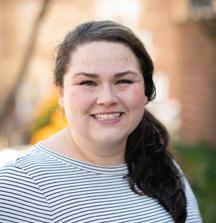
Marisa Charley Associate Director Bonner Program Director Instructor of Poverty Studies

Fran Elrod Associate Director Instructor of Poverty Studies
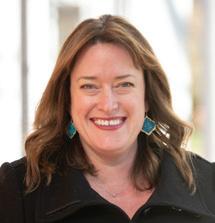
Molly Michelmore Professor of History
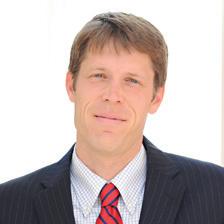
Howard Pickett Director of the Shepherd Program; Associate Professor of Ethics and Poverty Studies
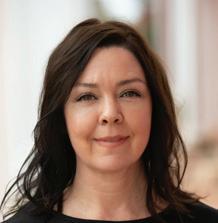
Erin Taylor Associate Professor of Philosophy
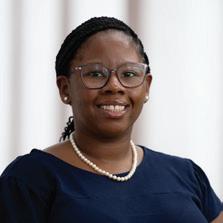
Candice Robinson Assistant Professor of Sociology
Welcome Candice Robinson, Assistant Professor of Sociology!
Charles Allen ’99 (2025) Washington, D.C.
Cynthia Cheatham ’07 (2024) Washington, D.C.
Bethlehem Dammlash ’06 (2025) Washington, D.C.
George Foote ’71 (2024) Alexandria, VA
Leah Gose ’15 (2025) Los Angeles, CA
Mason Grist ’18 (2025) Washington, D.C.
Anjelica Hendricks ’15L (2024) Philadelphia, PA
Kelli Jarrell ’12 (2027) Cincinnati, OH
Melissa Medeiros ’09 (2026) Washington, D.C.
Elizabeth Mugo ’19 (2025) Washington, D.C.
Jamila Seaton ’09 (2026) Green Bay, WI
Kerriann Shabanowitz ’13, ’16L (2025) Burke, VA
Sonia Siu ’07 (2024) Chair Boston, MA
Madison Sanders ’16 (2027) Athens, GA
Duke Cancelmo ’80 * Houston, TX
Chawne Kimber Dean of the College and Professor of Mathematics
Nancy McIntyre Director of University Academic Development
John Nolan ’70 * Chevy Chase, MD
Howard Pickett Director of the Shepherd Program; Associate Professor of Ethics and Poverty Studies Shepherd Program
Stacy McLoughlin Taylor ’02 * Philidelphia, PA
WELCOME INCOMING MEMBERS
Tyra Barrett ’18 Atlanta, GA
Samara Gibbs ’10 Memphis, TN
Kelly Nichols ’00 Austin, TX
Maisie Osteen ’14L Richmond, VA
Isaac Webb ’13 Washington, D.C.
Kiko Spiezio ’17 (2027) Boston, MA
Alvin Thomas ’14 (2024) St. Louis, MO
Christopher
Shiri
Eric White ’74 * Richmond, VA
Jonathan Wortham ’04 * Atlanta, GA
* Former Board Chair
